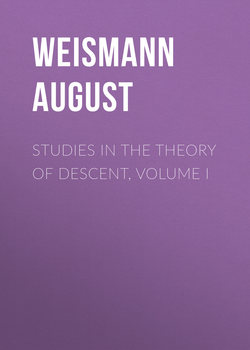Читать книгу Studies in the Theory of Descent, Volume I - Weismann August - Страница 1
PREFATORY NOTICE
ОглавлениеThe present work by Professor Weismann, well known for his profound embryological investigations on the Diptera, will appear, I believe, to every naturalist extremely interesting and well deserving of careful study. Any one looking at the longitudinal and oblique stripes, often of various and bright colours, on the caterpillars of Sphinx-moths, would naturally be inclined to doubt whether these could be of the least use to the insect; in the olden time they would have been called freaks of Nature. But the present book shows that in most cases the colouring can hardly fail to be of high importance as a protection. This indeed was proved experimentally in one of the most curious instances described, in which the thickened anterior end of the caterpillar bears two large ocelli or eye-like spots, which give to the creature so formidable an appearance that birds were frightened away. But the mere explanation of the colouring of these caterpillars is but a very small part of the merit of the work. This mainly consists in the light thrown on the laws of variation and of inheritance by the facts given and discussed. There is also a valuable discussion on classification, as founded on characters displayed at different ages by animals belonging to the same group. Several distinguished naturalists maintain with much confidence that organic beings tend to vary and to rise in the scale, independently of the conditions to which they and their progenitors have been exposed; whilst others maintain that all variation is due to such exposure, though the manner in which the environment acts is as yet quite unknown. At the present time there is hardly any question in biology of more importance than this of the nature and causes of variability, and the reader will find in the present work an able discussion on the whole subject, which will probably lead him to pause before he admits the existence of an innate tendency to perfectibility. Finally, whoever compares the discussions in this volume with those published twenty years ago on any branch of Natural History, will see how wide and rich a field for study has been opened up through the principle of Evolution; and such fields, without the light shed on them by this principle, would for long or for ever have remained barren.
Charles Darwin.
